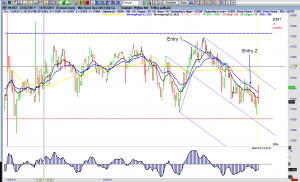Markets: introduction
 Markets are a fascinating, fundamental yet so unknown feature of ancient and modern life alike.
Markets are a fascinating, fundamental yet so unknown feature of ancient and modern life alike.
The first part of this chapter shows a brief general introduction to the markets, the second goes deep into the more theoretical elements that are at the foundation of the markets.
This trading course will focus a lot on currency pairs trading, also known as Forex. The reason for this is because Forex is the lowest entry barrier, cheapest financial market a perspective trader may start training with. Whereas other markets could require expensive software, market data feed fees and a minimum of several thousands dollars account, Forex may be approached with as low as .
Markets: the basics
Markets are not something complicate or abstract, they are something we live every day. Every time someone buys or even barter something, a trade happens. The place where this activity happens is called a market. The most basic market features a buyer and a seller, this scales up to thousands of buyers / sellers, to exchanges and brokerages but in the end the concept is still the same: counterparts taking one of two positions: buying (also known as “going long”) or selling (also known as “going short”).
T his course is aimed at trading a specific kind of assets, called “financial products“, also known as securities. It also covers the markets where these securities are exchanged. Securities have often used to be contracts written on paper. They are a legally binding contract between two or more parties often precisely specifying all sorts of fine details. Here is an example of a very common future contract, called e-mini S&P 500.
his course is aimed at trading a specific kind of assets, called “financial products“, also known as securities. It also covers the markets where these securities are exchanged. Securities have often used to be contracts written on paper. They are a legally binding contract between two or more parties often precisely specifying all sorts of fine details. Here is an example of a very common future contract, called e-mini S&P 500.
These days most contracts are electronically traded through high speed dedicated communication lines and Internet.
The markets may be operated with this method. Each market may be tradeded by using specific software called “trading platforms”. Those range from free solutions with basic charting capabilities and market orders entry to very expensive and complicate platforms that include very advanced orders structures.
Brief list of common markets
Follows a list of the most common markets and some of their characteristics.
- Forex or currency pairs: the easiest to get into, the lowest entry barrier of all. Trading platforms often come free (expecially one called Metatrader), brokers accepts small accounts, some times as low as . Despite this, Forex markets are not the simplest to tackle of all due to an amount of “background trading noise” that may somewhat affect price.
- Futures, featuring currencies, indexes, metals and many other commodities: they have higher requirements than Forex. The higher fees and the exchanges opening hours sometimes limited to the U.S.A. time zones work hours, make trading futures somewhat of a more difficult choice. Often times the brokers require a recurring payment to use their platform, they also often require to pay for the market price data feed. Sometimes they even ask a fee to give access to historic data. Often times, brokers demand several thousands of dollars to open an account. These amounts are required because of a feature called margin usually used in conjunction with another feature called “leverage“. Leverage lets traders earn more profits (or take bigger losses) by effectively multiplying their money at market. Futures come with medium and high leverage and this requires a larger buffer in their margin account.
- Shares, stocks: these are the most classic markets. They come with very low leverage and easily require accounts outside of the grasp of a new trader. Furthermore they have commissions not seen in Forex and managing open positions in them is harder. In fact they often show a low liquidity (this means, not many traders in those markets and not much money) and thus high volatility that may kick traders out of their trade.
- ETF, funds etcetera: those are more advanced and sometimes illiquid and deceiving markets (expecially the inverse ETFs). It’s suggested not to trade them until a good experience has been gained.
- Options and other markets: those are advanced markets best left to those with great experience, that is not this course’s audience.
Further markets basics study
Before proceeding with the rest of the course, the Reader should visit the following Baby Pips web sites and complete their beginner tutorial, called “school”, all down to “graduation”. This tutorial provides a very newcomer friendly introduction to Forex, this course’s choice as marketplace due to it being fast, easy and cheap to get started into.
![]() The English version of the course is available at ~1~.
The English version of the course is available at ~1~.
Comments